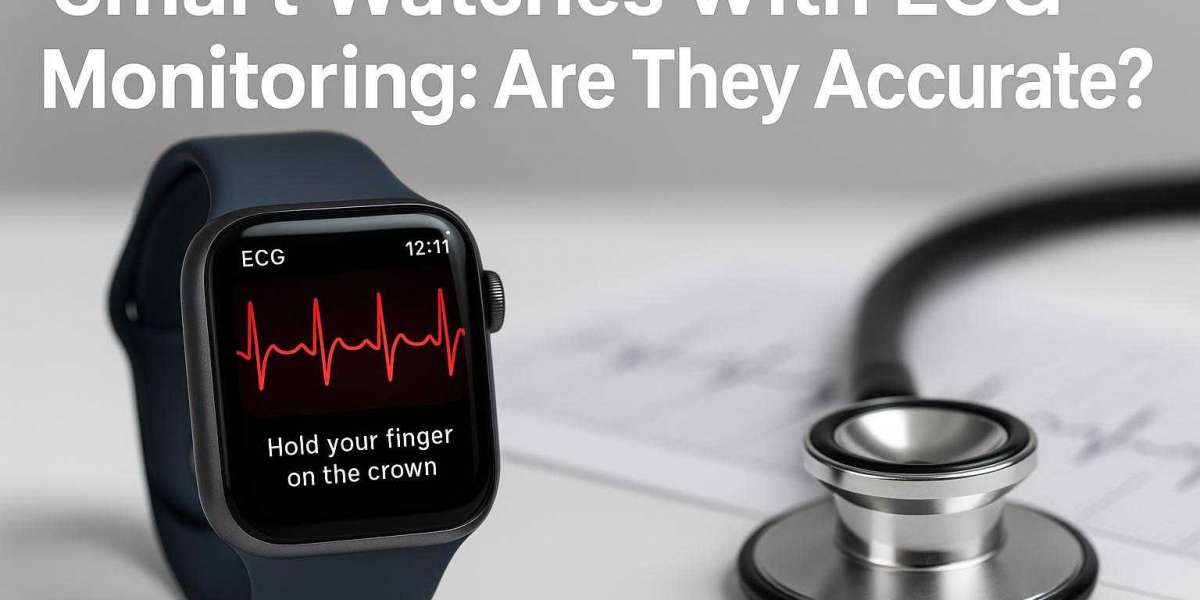Smart Watches with ECG Monitoring: Are They Accurate?
Introduction
With the rise of wearable technology, smartwatches have evolved from simple fitness trackers to sophisticated health-monitoring devices. One of the most significant innovations in recent years is ECG (Electrocardiogram) monitoring, a feature now available in several high-end smartwatches. But how accurate are ECG monitoring watches? Can they truly replace clinical ECG machines? This article explores the capabilities, accuracy, and real-world implications of smartwatches with ECG monitoring.
Understanding ECG Monitoring in Smartwatches
What is ECG Monitoring?
An electrocardiogram (ECG or EKG) records the electrical activity of the heart. Traditional ECG machines use multiple electrodes placed on the body to measure heart rhythms, detect arrhythmias, and assess overall cardiac health.
How Do Smartwatches Measure ECG?
Unlike hospital-grade ECG machines, smartwatches use a single-lead ECG sensor built into the watch's body. Users place their fingers on the sensor (typically on the watch crown or a dedicated button) to record a 30-second ECG waveform. The watch then analyzes the data to detect irregularities like atrial fibrillation (AFib) and normal sinus rhythm.
Accuracy of ECG Monitoring Watches
Comparing Smartwatches to Medical-Grade ECGs
Single-lead vs. 12-lead ECG: Smartwatches use a single-lead ECG, while medical devices use 12 leads for a more comprehensive heart analysis.
Detection of Arrhythmias: Studies have shown that leading ECG smartwatches can accurately detect AFib but may not catch more complex heart conditions requiring multi-lead data.
FDA Medical Approvals: Many ECG smartwatches, such as the Apple Watch and Samsung Galaxy Watch, have received FDA clearance, meaning they meet certain medical accuracy standards.
Research Clinical Studies
Several studies have evaluated the accuracy of smartwatch ECG monitoring:
Apple Heart Study (Stanford University, 2019): Found that the Apple Watch detected AFib with 84% sensitivity and 99% specificity.
Mayo Clinic Study (2022): Confirmed that smartwatch ECGs are reliable for AFib detection but should not replace full medical evaluations.
Popular Smartwatches with ECG Monitoring
1. Apple Watch Series 8 Ultra
FDA-cleared ECG sensor.
Detects AFib and provides irregular heart rhythm notifications.
Integrated with Apple Health for long-term heart tracking.
2. Samsung Galaxy Watch 6
Approved by the FDA for ECG monitoring.
Syncs with Samsung Health for easy access to ECG readings.
Measures blood pressure (requires calibration with a traditional BP cuff).
3. Fitbit Sense 2
Provides AFib detection via Fitbit’s ECG app.
Tracks heart rate variability (HRV) for stress and recovery insights.
Works with Fitbit Premium for deeper health analysis.
4. Garmin Venu 2 Plus
Offers ECG capabilities with health insights.
Targets athletes with fitness-first heart health monitoring.
Less focus on medical-grade ECG analysis compared to Apple and Samsung.
Case Studies Real-Life Use
Case Study 1: Atrial Fibrillation Detection
John, a 52-year-old runner, experienced occasional palpitations but ignored them. His Apple Watch Series 7 detected an irregular rhythm, prompting him to visit a cardiologist. Tests confirmed AFib, leading to early treatment and reduced stroke risk.
Case Study 2: ECG Accuracy in Athletes
Maria, a marathon runner, used the Garmin Venu 2 Plus to track heart rate irregularities during training. While the smartwatch detected some fluctuations, a medical ECG confirmed her heart was healthy, showing that wearables should complement, not replace, professional evaluations.
Pros Cons of ECG Monitoring Watches
Pros
✅ Early Detection: Can alert users to potential heart issues like AFib. ✅ Convenience: Enables heart monitoring anytime, anywhere. ✅ FDA Clearance: Many ECG smartwatches meet medical accuracy standards. ✅ Data Integration: Syncs with health apps for long-term tracking.
Cons
❌ Limited Leads: Single-lead ECGs are not as comprehensive as hospital-grade ECGs. ❌ False Positives: May detect irregularities that require further medical testing. ❌ Not a Replacement: Should be used as a screening tool, not a diagnostic device.
FAQs About ECG Smartwatches
1. Are smartwatch ECGs accurate for diagnosing heart disease?
Smartwatch ECGs are useful for detecting AFib, but they cannot diagnose heart disease as effectively as a 12-lead ECG used in hospitals.
2. Can ECG smartwatches detect heart attacks?
No, smartwatch ECGs are not designed to detect heart attacks. If you experience chest pain, seek emergency medical attention.
3. Are all ECG smartwatches FDA-approved?
Not all ECG smartwatches are FDA-cleared. Brands like Apple, Samsung, and Fitbit have FDA approval, while others may not meet the same medical standards.
Conclusion
ECG monitoring watches are a valuable tool for heart health tracking, especially for those at risk of AFib. While they provide convenience and early warnings, they are not a replacement for professional medical evaluations. If you rely on wearable ECGs, always follow up with a healthcare provider for comprehensive heart assessments.
For those interested in learning more about smartwatch advancements, check out the Evolution of Smart Watches. If you’re looking for the best Smart Watches prices in Pakistan, explore the latest options available.
What do you think about ECG smartwatches? Have you used one? Share your thoughts in the comments below!




